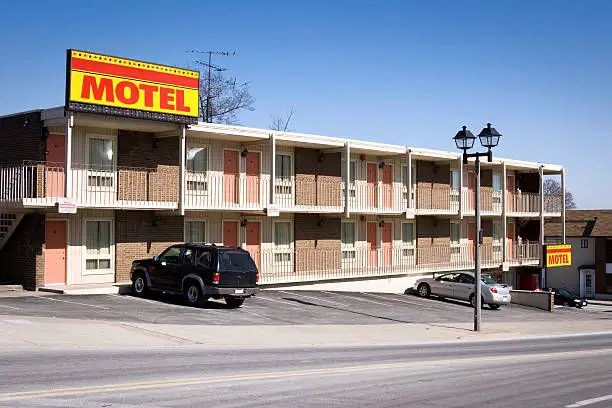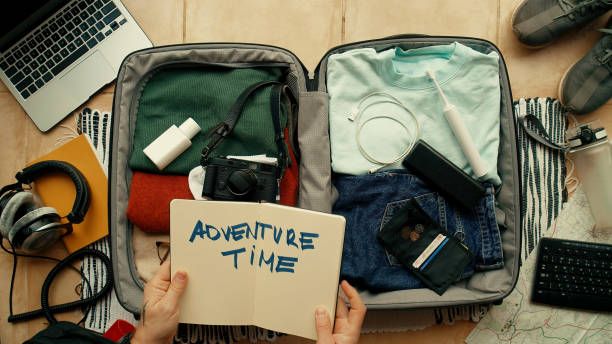Tips For Planning The Ultimate Road Trip

The allure of a road trip is something that is hard to resist. There is something about hitting the open road with nothing but your vehicle and a sense of adventure that can be incredibly freeing.
Whether it's a solo trip or a group excursion, a road trip is an experience that can leave lasting memories and create lifelong bonds.
One of the greatest things about a road trip is the sense of freedom it provides. When you're on the road, you are the master of your own destiny.
You can stop and explore whenever you want, change your route on a whim, and take detours that you might never have discovered otherwise.

There's something thrilling about not knowing exactly what lies ahead and being open to the surprises that come your way.
Another great thing about road trips is that they can be incredibly budget-friendly. Depending on your route and your preferences, a road trip can be a much more cost-effective option than flying or taking public transportation.
You can choose to camp or stay in budget-friendly hotels or motels, and you can save money by cooking your own meals instead of eating out every day.
Plus, many of the best road trip destinations offer free or low-cost attractions, such as national parks and scenic drives.

Of course, a road trip isn't just about saving money - it's about the experience itself. The journey can be just as important as the destination, and a road trip provides ample opportunity for both.
You can take in stunning landscapes and natural wonders, experience local culture and cuisine, and meet interesting people along the way.
A road trip can be a chance to disconnect from the stresses of daily life and immerse yourself in the beauty and wonder of the world around you.
That said, a road trip isn't always easy. There can be long stretches of driving, unexpected setbacks and challenges, and the occasional disagreement with your travel companions. But these difficulties can also be part of the adventure.

They can test your resilience and creativity, and provide opportunities for growth and learning. Plus, overcoming challenges and working through disagreements can strengthen bonds and deepen relationships.
So, if you're considering a road trip, go for it! Plan your route, pack your bags, and hit the road with an open mind and a sense of adventure.
Whether you're exploring your own country or venturing into unfamiliar territory, a road trip can be an incredible experience that will stay with you for a lifetime.
Determine your budget

Determining your budget is an essential step in planning a road trip. Here are some tips on how to do it:
Calculate your total expenses: Make a list of all the expenses you'll have during your trip, including gas, accommodations, food, activities, and any other expenses you may have.
Research the average cost of these expenses in the areas you'll be visiting to get a better idea of what you can expect to spend.
Determine the length of your trip: The longer your trip, the more you can expect to spend. Consider how many days you'll be on the road and adjust your budget accordingly.
Decide on your spending limits: Be honest with yourself about how much you can afford to spend. Consider your current financial situation and other expenses you have in your life. Set a realistic spending limit for your trip and stick to it.
Look for ways to save money: There are plenty of ways to save money on a road trip, such as staying in budget-friendly accommodations like campsites or hostels, packing your own food instead of eating out, and choosing free or low-cost activities like hiking or visiting public parks.
Consider unexpected expenses: It's always a good idea to have a buffer in your budget for unexpected expenses, like car repairs or emergency medical expenses.
By following these tips, you can determine a realistic budget for your road trip and ensure you have a memorable adventure without breaking the bank.
Choose your route

Choosing the route for your road trip is an important decision, as it will determine the places you'll see and the experiences you'll have. Here are some tips on how to choose the best route for your road trip:
Research your destination: Start by researching the areas you want to visit. Consider the season, weather, and popular attractions in the area. Use travel guides, websites, and social media to get a better idea of what to expect.
Consider your interests: Think about the activities and experiences that interest you the most. Do you prefer outdoor adventures or cultural experiences? Are you interested in visiting national parks or big cities? Use your interests as a guide when choosing your route.
Determine your travel time: Be realistic about how much time you have for your road trip. Factor in travel time, rest breaks, and sightseeing opportunities. Don't try to cram too much into your itinerary, as this can lead to burnout and stress.
Use online resources: There are many online resources available to help you plan your route. Use tools like Google Maps or Roadtrippers to map out your journey and find points of interest along the way.
Be flexible: Remember to leave room for flexibility in your route. Unexpected detours or spontaneous stops can lead to some of the best experiences of your trip.
Consider your budget: Your budget will also play a role in choosing your route. Some destinations may be more expensive than others, so consider this when deciding where to go.
By following these tips, you can choose a route that fits your interests, travel time, and budget, and ensure you have a memorable road trip.
Plan your stops

Planning your stops is an important part of planning a road trip. Here are some tips on how to plan your stops effectively:
Determine the length of your trip: The length of your trip will play a big role in planning your stops. If you're taking a long trip, you may need to plan for overnight stays, while a shorter trip may only require a few rest breaks.
Consider your travel time: Factor in your travel time when planning your stops. You don't want to drive for too long without a break, as this can lead to fatigue and decreased alertness.
Research points of interest: Use online resources to research points of interest along your route. This can include scenic viewpoints, national parks, museums, or other attractions. Make a list of the top places you want to see and plan your stops accordingly.
Plan for food and rest breaks: Be sure to plan for food and rest breaks along your route. Look for rest areas, gas stations, and restaurants that are conveniently located along your route.
Stay flexible: While it's important to plan your stops, it's also important to stay flexible. Unexpected events or detours may require you to adjust your plans. Be willing to change your itinerary if necessary.
Schedule downtime: It's important to schedule downtime during your road trip. This can include time for relaxation, leisurely meals, or exploring a new city at your own pace. This can help you avoid burnout and ensure you have a more enjoyable trip.
By following these tips, you can plan your stops effectively and ensure you have a memorable and enjoyable road trip.
Decide on accommodations

Deciding on accommodations is an important part of planning a road trip. Here are some tips on how to choose the best accommodations for your trip:
Determine your budget: Your budget will play a big role in deciding on accommodations. Decide how much you're willing to spend on lodging each night and look for options that fit your budget.
Consider your travel style: Your travel style will also influence the type of accommodations you choose. If you're a budget traveler, you may prefer hostels or camping. If you prefer more comfort and amenities, hotels or vacation rentals may be a better fit.
Research your options: Use online resources to research your accommodation options. Look for reviews, ratings, and photos to get a better idea of what to expect. Consider the location, amenities, and services offered by each option.
Plan ahead: Popular destinations and peak travel times can result in high demand for accommodations. Plan ahead and make reservations in advance to ensure you have a place to stay.
Look for deals and discounts: There are many ways to save money on accommodations, such as booking early, using travel rewards programs, or looking for last-minute deals.
Stay flexible: Be willing to adjust your accommodations as needed. Unexpected events or changes in your itinerary may require you to change your plans.
By following these tips, you can choose the best accommodations for your road trip, whether you're looking for budget-friendly options or more luxurious accommodations.
Pack smart

Packing smart is essential for a successful road trip. Here are some tips on how to pack smart for your next adventure:
Make a list: Before you start packing, make a list of everything you need to bring. This can help you avoid forgetting important items and ensure you don't overpack.
Pack light: Remember, you'll be traveling by car, so space may be limited. Pack only what you need and try to keep your luggage to a minimum. This can make it easier to pack and unpack and ensure you have more room in the car.
Plan for different weather conditions: Depending on where you're traveling, you may encounter a variety of weather conditions. Be sure to pack clothing and gear that is appropriate for the weather, such as warm clothes for cold weather or rain gear for rainy days.
Bring essential travel items: There are a few essential items you'll want to bring on your road trip, such as a GPS or map, car charger, first-aid kit, and reusable water bottle. Don't forget to bring any necessary medications or personal items as well.
Use packing cubes or organizers: Packing cubes or organizers can help you stay organized and make it easier to find what you need. Use them to separate clothing, toiletries, and other items in your luggage.
Leave room for souvenirs: If you plan on buying souvenirs or gifts during your trip, be sure to leave some extra space in your luggage. You may also want to bring an extra bag or duffle for additional items.
By following these tips, you can pack smart for your road trip and ensure you have everything you need for a comfortable and enjoyable adventure.
Get your car ready

Getting your car ready is a crucial step in planning a road trip. Here are some tips on how to get your car ready for the journey:
Check your tires: Make sure your tires are properly inflated and have enough tread. This can help improve your car's handling and fuel efficiency.
Check your fluids: Check your oil, coolant, and transmission fluids. Make sure they are at the proper levels and look for any signs of leaks.
Check your brakes: Make sure your brakes are working properly and have enough brake pads. This can help ensure your car stops safely and quickly in case of an emergency.
Check your battery: Make sure your battery is in good condition and has enough charge. If your battery is old or weak, consider getting it replaced before your trip.
Get a tune-up: Consider getting a tune-up before your trip. This can help identify any potential problems and ensure your car is running smoothly.
Prepare an emergency kit: Pack an emergency kit in case of any unexpected breakdowns or accidents. Include items such as a spare tire, tire jack, jumper cables, flashlight, and first-aid kit.
Plan for maintenance stops: Plan for regular maintenance stops during your trip. This can include oil changes, tire rotations, and other routine maintenance.
By following these tips, you can get your car ready for your road trip and help ensure a safe and enjoyable journey.
Be flexible

Being flexible is key to enjoying your road trip. Here are some tips on how to be flexible during your journey:
Be open to changing plans: Unexpected events or changing circumstances may require you to adjust your plans. Be open to changing your route, accommodations, or activities as needed.
Allow extra time: Traffic, construction, and other delays can cause unexpected delays. Allow extra time in your itinerary to account for any unforeseen delays.
Embrace spontaneity: Sometimes the best moments on a road trip are the unplanned ones. Be open to spontaneous adventures and activities that you discover along the way.
Take breaks: Driving for long periods of time can be exhausting. Take regular breaks to stretch your legs, grab a snack, or take in the sights. This can help you stay alert and energized during your journey.
Stay flexible with your budget: Unexpected expenses can arise during a road trip. Stay flexible with your budget and be willing to adjust your spending as needed.
Keep an open mind: Road trips can be unpredictable and full of surprises. Keep an open mind and be willing to embrace new experiences and perspectives.
By being flexible, you can make the most of your road trip and enjoy all that the journey has to offer.
Have fun

Having fun is the ultimate goal of a road trip! Here are some tips to ensure that you have a fun and enjoyable journey:
Embrace the adventure: A road trip is an adventure, so embrace it! Don't be afraid to step outside of your comfort zone and try new things.
Make a playlist: A road trip playlist can make the journey more enjoyable. Choose music that you and your travel companions will love and sing along to.
Play games: Road trip games can help pass the time and keep everyone entertained. Some popular options include I Spy, 20 Questions, and the License Plate Game.
Take plenty of photos: A road trip is full of memorable moments, so be sure to take plenty of photos to capture the memories.
Try local cuisine: Sampling local cuisine is one of the best parts of a road trip. Be adventurous and try new foods and restaurants along the way.
Take breaks to enjoy the scenery: One of the best parts of a road trip is the scenery. Take breaks to stretch your legs and take in the beautiful landscapes and sights.
Be present in the moment: Don't get too caught up in planning and logistics. Be present in the moment and enjoy the journey as it unfolds.
By following these tips, you can ensure that your road trip is a fun and memorable adventure.
